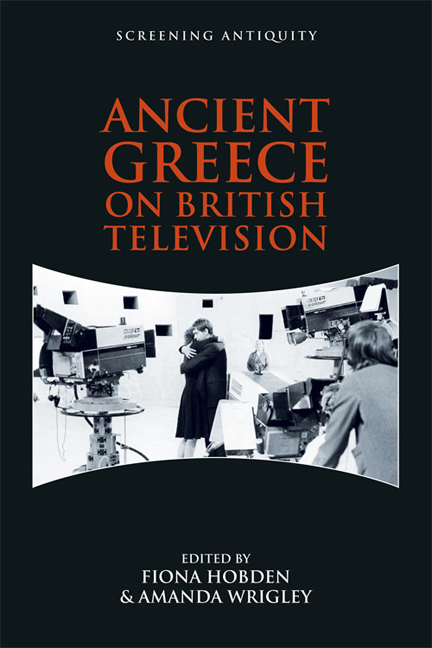Book contents
- Frontmatter
- Contents
- List of Figures and Tables
- Series Editors’ Preface
- Acknowledgements
- Contributors
- Abbreviations
- Broadcasting Greece: An Introduction to Greek Antiquity on the Small Screen
- 1 Are We the Greeks? Understanding Antiquity and Ourselves in Television Documentaries
- 2 Louis MacNeice and ‘The Paragons of Hellas’: Ancient Greece as Radio Propaganda
- 3 The Beginnings of Civilisation: Television Travels to Greece with Mortimer Wheeler and Compton Mackenzie
- 4 Tragedy for Teens: Ancient Greek Tragedy on BBC and ITV Schools Television in the 1960s
- 5 The Serpent Son (1979): A Science Fiction Aesthetic?
- 6 Don Taylor, the ‘Old-Fashioned Populist’? The Theban Plays (1986) and Iphigenia at Aulis (1990): Production Choices and Audience Responses
- 7 The Odyssey in the ‘Broom Cupboard’: Ulysses 31 and Odysseus: The Greatest Hero of Them All on Children’s BBC, 1985–1986
- 8 Greek Myth in the Whoniverse
- 9 The Digital Aesthetic in ‘Atlantis: The Evidence’ (2010)
- 10 Greece in the Making: From Intention to Practicalities in Television Documentaries. A Conversation with Michael Scott and David Wilson
- Bibliography
- Index
1 - Are We the Greeks? Understanding Antiquity and Ourselves in Television Documentaries
Published online by Cambridge University Press: 24 April 2021
- Frontmatter
- Contents
- List of Figures and Tables
- Series Editors’ Preface
- Acknowledgements
- Contributors
- Abbreviations
- Broadcasting Greece: An Introduction to Greek Antiquity on the Small Screen
- 1 Are We the Greeks? Understanding Antiquity and Ourselves in Television Documentaries
- 2 Louis MacNeice and ‘The Paragons of Hellas’: Ancient Greece as Radio Propaganda
- 3 The Beginnings of Civilisation: Television Travels to Greece with Mortimer Wheeler and Compton Mackenzie
- 4 Tragedy for Teens: Ancient Greek Tragedy on BBC and ITV Schools Television in the 1960s
- 5 The Serpent Son (1979): A Science Fiction Aesthetic?
- 6 Don Taylor, the ‘Old-Fashioned Populist’? The Theban Plays (1986) and Iphigenia at Aulis (1990): Production Choices and Audience Responses
- 7 The Odyssey in the ‘Broom Cupboard’: Ulysses 31 and Odysseus: The Greatest Hero of Them All on Children’s BBC, 1985–1986
- 8 Greek Myth in the Whoniverse
- 9 The Digital Aesthetic in ‘Atlantis: The Evidence’ (2010)
- 10 Greece in the Making: From Intention to Practicalities in Television Documentaries. A Conversation with Michael Scott and David Wilson
- Bibliography
- Index
Summary
Sir John Wolfenden: ‘I think it's true to say, don't you, that what the Greeks did in the questions they raised, in their thinking, the books they wrote, the poetry they wrote, the experiments in living, in political democracy, all those things, they all start there … Wherever you look in the fields of art or history or political living, it all starts in Greece … Well, I would go so far as to say, myself, if I were really pushed, that Western civilization as we talk about it, including American civilization, the whole of western Europe really, when you get down to it, what it doesn't get from the Bible it gets from the ancient Greeks.’
Sir Mortimer Wheeler: ‘Well, that I will argue with you after dinner.’ ‘Venice to Mycenae’, Armchair Voyage: Hellenic CruiseStanding on the deck of a cruise ship destined for Greece, Sir John Wolfenden, a prominent educationalist and guest speaker on the tour, is asked by the well-known archaeologist and presenter of Armchair Voyage: Hellenic Cruise (BBC, 1958; henceforth Hellenic Cruise), Sir Mortimer Wheeler, to explain the ‘extraordinary pull’ of Greece today. After considering the natural landscape and the buildings and statues the ancient Greeks left behind, Wolfenden turns to the political and cultural inheritance. These, he asserts, are the basis of modern civilisation in the West. Wheeler appears unconvinced, and yet, as the ship travels on to Olympia and footage of the ruined sanctuary appears on screen, he observes, ‘the newcomer most readily finds contact with that sense of beauty and humanity that are the basic contributions of Greece to the modern world’. Wolfenden's proposition is sustained. Hellenic Cruise, the first British television documentary to engage with ancient Greece at the time of broadcast, establishes the relationship between the Hellenic past and Western present as one of inheritance. In this, the programme was far from unique. For example, in 1821 the English romantic poet Percy Bysshe Shelley wrote passionately that ‘We are all Greeks – our laws, our literature, our religion and our art have their root in Greece’, when attempting to encourage his British compatriots to support the Greek struggle for independence from Turkish rule.
- Type
- Chapter
- Information
- Ancient Greece on British Television , pp. 24 - 43Publisher: Edinburgh University PressPrint publication year: 2018



